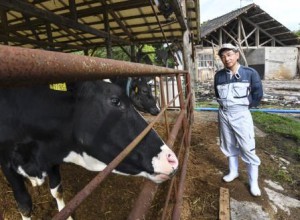Kumamoto and its neighboring prefectures marked one month on April 14 since the first of two massive earthquakes struck the region. People in the agricultural sector are growing their concerns that some of the quake-hit farmers will face a serious problem of “double loan debts” when they challenge to rehabilitate their farm management by getting a new loan without paying off an existing debt.

Takao Tsuruta gazes at his dairy cows. His milking shed (behind him) is now out of use since the facility was completely destroyed by the earthquake. (Kikuchi-shi, Kumamoto prefecture)
In the territory of Kikuchi Agricultural Cooperative (JA Kikuchi), based at Kikuchi-shi, Kumamoto prefecture, which is one of the biggest milk producing areas in Japan, a number of caw barns were crashed down by the heavy quakes and aftershocks. Rebuilding of each facility is estimated to cost several tens of millions of yen. If a quake-hit dairy farmer has an existing loan, the reconstruction could force him to sink deeper into debt.
Takao Tsuruta, 53, a dairy farmer feeding 40 delivered cows and 25 calves in Kikuchi-shi, had his milking shed destroyed by the quake. He wishes to rehabilitate his farm management, which requires an investment of several tens of millions of yen. His existing loan of 20 million yen has not been paid off. He is hesitating to tackle a problem of double loan debts in order to reconstruct his barn and milking facilities.
The dairy farmers are worrying not only about the double loan debts, but also possible reduction of their income. Those farmers in the JA Kikuchi area had shipped fresh milk of some 240 tons per day before the earthquake struck the area. An amount of the milk shipment, however, has decreased by 20 percent. Milk yields of aftershock-stressed dairy cows have been declining. They have not yet recovered to the level prior to the earthquake.
After the Great East Japan Earthquake heavily slammed the Tohoku Region on March 11, 2011, the Government implemented measures to relieve farmers and small and medium-sized businesses from double loan problems. The measures were special programs under which a newly established governmental organization purchased exiting loans from financial institutes and the organization provided debtors with long-term and interest-free loans. Furthermore the governmental financial institute lent them new loans with special conditions.
Representatives of JA Kikuchi urged the authorities to carry out the similar program for quake-hit farmers saying “Farmers are eager to revitalize their dairy farming in the area. They should not be discouraged. The special relief policy is now required to be fully implemented as countermeasures against their double loan debts.”

